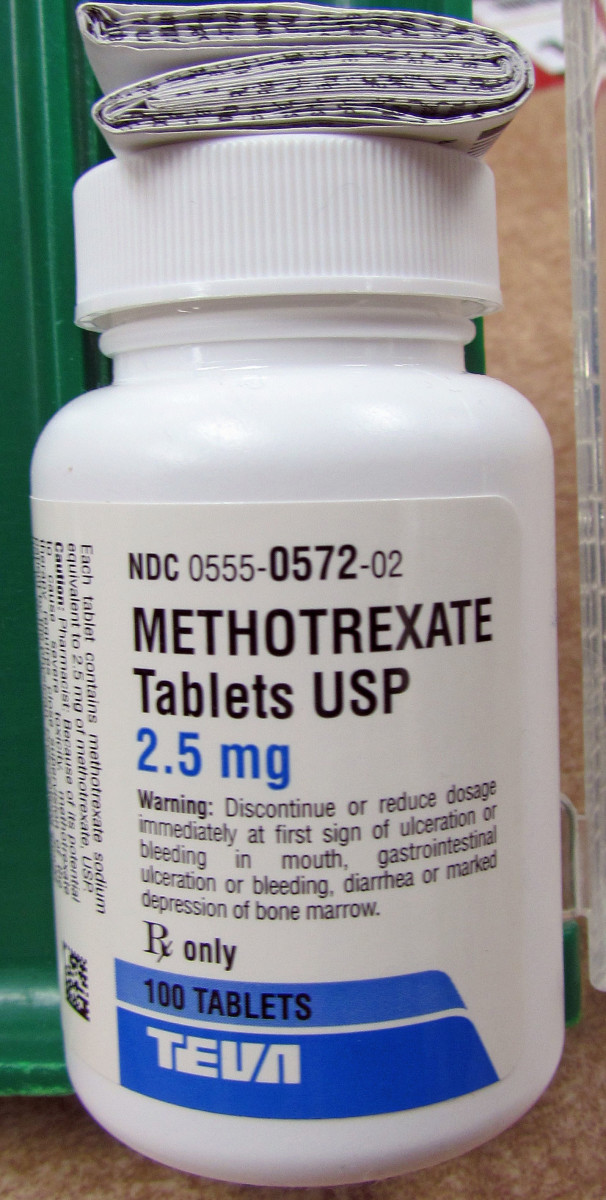What are SSRIs? How are SSRIs Used?
SSRI: Selective Serotonin Reuptake Inhibitor
What is an SSRI? SSRI stands for "Selective Serotonin Reuptake Inhibitor." Chances are, even if you did not know what "SSRI" stood for, you would recognize the names of several popular prescription drugs that fall into this category. Names like Prozac, Paxil and Zoloft have become nearly household words and slogans. Books and movie titles have incorporated these brand names and received instant recognition in a society so familiar with these remedies. But what does an SSRI actually do? How does it work? What are they used for? And what SSRI's are currently available and on the market today? In this article I am going to provide you with enough information to make you "SSRI Savvy" even in the most medically minded company.
In this article I will address the following questions:
- What are the SSRI drugs currently avaialble?
- How do SSRIs work
- What are SSRIs used for?
- What are the most common side effects associated with SSRIs?



1. AVAILABLE SSRIs
SSRIs are only available by prescription (in the U.S. at least). The following are all the currently available SSRIs. I will list the BRAND name, followed by the (generic name). Note: Every prescription brand name drug has a generic NAME. That does not mean, however, that they have a generic available. I will list the generic name in BOLD and UNDERLINED if the generic is currently available.
- Celexa (citalopram)
- Lexapro (escitalopram)
- Luvox (fluvoxamine)
- Luvox CR (fluvoxamine CR)
- Paxil (paroxetine hcl)
- Paxil CR (paroxetine hcl CR)
- Pexeva (paroxetine mesylate)
- Prozac (fluoxetine)
- Prozac Weekly (fluoxetine)
- Sarafem (fluoxetine)
- Zoloft (sertraline)
These are all of the currently available SSRIs. As you may already know, generic products are generally more cost-effective, so the above list should be helpful in making choices about the lower priced products currently available.

2. HOW DO SSRIs WORK
HOW THEY WORK:
SEROTONIN: To understand a little about how SSRIs work, we need to begin with a brief discussion about serotonin itself. Serotonin is a - get ready for this big word - neurotransmitter. Sounds scary, huh? Our body manufacturers serotonin from the amino acid known as Tryptophan. Another name for serotonin is "5-HT" which stands for "5 HydroxyTryptamine." Think of serotonin as a sort of chemical messenger in the body. I usually explain the main function of serotonin in the body in terms of the THREE B's: Belly, Blood and Brain. In the belly (the intestines really), serotonin helps to promote contraction and move food through the GI system. Serotonin also plays a role in nausea. In the blood, serotonin plays a role in helping blood to clot and contributes to blood vessel constriction. In the brain serotonin seems to have a variety of complicated roles related to things like aggression, anxiety and mood. Serotonin also has several other functions which I won't go into at this point.
SSRI's: A selective serotonin re-uptake inhibitor works primarily by impacting serotonin levels in the brain. The mechanism is a bit complex. Serotonin is released from one nerve cell (a neuron), travels through a brief space and is taken up by the next neuron. The little space or gap through which serotonin travels is called the "synapse." This synapse generally does not like to get too crowded, so whatever serotonin does not enter the next neuron is generally "taken up" back into the neuron from which it was released. It is this "re-uptake" that SSRI's effectively block. An SSRI selectively (that is, they specifically target serotonin) inhibits the re-uptake of serotonin back into the previous neuron, thus creating an excess of serotonin in the synapse. This "excess" serotonin in the synapse causes the cascade of reactions that bring about the desired (and sometimes undesired) effects.
This, obviously, has been an extremely brief review of their mechanism. If you are interested in more details about how SSRIs work, there are many fine articles written which will satisfy your hunger for knowledge. Here are a couple to get you started:

3. WHAT ARE SSRIs USED FOR?
HOW ARE THEY USED: Because of the complex of chemical responses associated with the use of SSRIs they have a number of conditions for which they have been found useful. I will provide a list of the indications for which SSRIs are prescribed. Not every SSRI has been proven to treat ALL of these conditions, but these are representative of how this class of medications is used.
- Depression and Major Depressive Disorder
- Premenstual Dysphoric Disorder (PDD)
- Panic Disorder
- Obsessive Compulsive Disorder (OCD)
- Generalized Anxiety Disorder
- Social Anxiety Disorder
- Posttraumatic Stress Disorder (PTSD)
- Bulimia nervosa (an eating disorder)
As you can see from the above list, SSRIs have been approved to treat a wide variety of emotional and psychological disorders. How exactly they work in each of these cases is not entirely clear. As a pharmacist I feel the need to remind patients of a couple things at this point.
A FEW WORDS FROM A PHARMACIST:
1) SEROTONIN SUPPLEMENTS: Just because SSRIs are used to treat these conditions does NOT imply that simply increasing serotonin through supplements will accomplish the same thing. You can buy serotonin in the supplement section of any pharmacy these days. However, taking such supplements has never been scientifically shown to produce similar results. Remember, getting "enough" serotonin is rarely the issue. Most of us make plenty of serotonin all on our own. It is the unique effect of these SSRIs at the re-uptake site of the neuron that seems to contribute to their effectiveness. The same can be said about "serotonin rich" foods. certain fruits, nuts, and vegetables (like walnuts, pineapples and bananas) contain measurable quantities of serotonin. The main problem is that the serotonin in supplements and foods CANNOT pass into the brain due to something known as the "blood brain barrier." It is only serotonin actually manufactured IN the brain that has can be manipulated through the use of SSRIs.
2) NOT A CURE: It is important to bear in mind that SSRIs are not like antibiotics which you take for a week or two and are cured. Although certain symptoms can be improved with SSRIs, this does not mean that SSRIs are a cure for these conditions. Also, this does not mean that serotonin imbalances are the root cause of depression. I wish it were that simple. These diseases are very complex and still not entirely understood. Many social and emotional factors come into play. But this family of medications has been successful for many people. If you have been prescribed an SSRI, I encourage you to be patient and give it a try. You were probably told (hopefully) that they typically take time to work, often 4-6 weeks before any benefit can be really observed. Also, in addition to SSRIs there are now many other families of antidepressant medications which have been used with success. Don't give up.

4. COMMON SSRI SIDE EFFECTS
SSRIs have side effects. Nearly every medication that has some "good" effects will also have some "bad" effects. These vary in degree from person to person and from drug to drug. These side effects may be mild and manageable, or may be so severe that you may need to discontinue a particular drug and try another. Many people will take an SSRI and not experience any side effects at all.
The following is a list of some of the more common side effects from SSRIs. Sometimes a specific drug is LESS likely to cause a particular side effect than others. Some are MORE likely to cause these effects than others. If you are struggling with that side effect, switching to this drug may help. I have noted such drugs in "( )" after the side effect.
- Nausea (More common with Paxil and Zoloft)
- Anxiety
- Drowsiness (Less common with Lexapro, More common with Paxil)
- Headache
- Insomnia (Less common with Lexapro and Celexa)
- Dry Mouth (Less common with Prozac and Lexapro)
- Weakness
- Sexual side effects (Less common with Lexapro)
- Decreased Appetite (Less common with Paxil)
- Sweating (Less common with Lexapro and Prozac)
- Diarrhea (Less common with Paxil, More Common with Prozac and Zoloft)
- Constipation (Less common with Paxil & Paxil CR)
- Weight Gain (Less common with Prozac and Zoloft)
Sample SSRI Suicide Warning

SSRIs AND SUICIDE
Although this article is intended to be a brief review of this category of medications, it could not be complete without at least some reference to the concern about suicidal thoughts and attempts related to the use of SSRIs. Since 2004, every SSRI carries a warning about the risk of suicidal thoughts associated with these products. This warning is the result of several findings which raised this concern, especially in children and young adults (under 24 years old).
Do SSRIs actually cause or contribute to suicidal thoughts and attempts? This is a very difficult question and there are conflicting studies at the moment. As a pharmacist, I want my patients to be informed about the potential risks associated with the medications they take. But I also want them to be able to put those risks in proper perspective, weighing the risks and benefits, and to remind them that they have the right to be fully informed about these facts prior to beginning any treatment. I cannot make a decision for you about taking or not taking an SSRI. Caution should be used, especially when treating children. Also, bear in mind, there are many non-pharmacological treatments for depression and anxiety which should also be considered.
HOPE THIS HELPS
I hope this brief review has provided you with some relevant and useful information to answer the question: "What is an SSRI?" There are, of course, many issues related to this family of medications that are beyond the scope of this brief review. If you want to know more, please feel free to leave a comment or ask a question. I'll try to help where I can. Blessings and best wishes!
Below are a few links to the websites for several SSRIs:
Paxil CR Prescribing Information
Sarafem Prescribing Information








